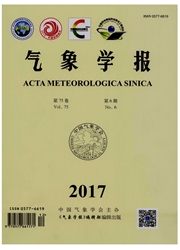

 中文摘要:
中文摘要:
利用中国气象局上海台风研究所整编的1961—2000年共40a热带气旋年鉴资料,对发生在西北太平洋上的变性台风的时空分布特征进行了诊断分析和研究。研究发现,发生于西北太平 洋上的变性台风的年频数呈现出明显的年代际变化特征, 主要特征是20世纪60年代偏多,70 至80年代显著减少,90年代初又略有回升,至90年代下半期每年发生变性的台风个数均极少 ;年际变化趋势呈现出逐年减少的特征,与西北太平洋上生成的总台风频数的变化趋势一致 ;西北太平洋上的变性台风多发生于夏、秋两季,特别集中于夏季与秋季的转换时期(变性 比例分别达到40%及46%);秋季较夏季台风发生变性的位置整体偏东;台风变性前移动路径 主要集中于朝鲜半岛以南及日本海附近,变性后路径多北上偏东;西北太平洋各月变性台风 在变性后6小时内平均强度均减弱,变性后12小时内平均强度仍继续减弱,变性后强度加强 的气旋的最低平均气压仅在6、7月份较变性前最明显。进一步通过对NCEP/NCAR月平均再分 析资料的500 hPa高度场的EOF分析,发现夏、秋两季,纬向环流指数与台风变性频数呈显著 负相关;中高纬度500 hPa距平高度场在夏半年为正距平区,对应着高压,宜于冷空气入侵 向高纬地区北上的台风,促进台风发生变性。
 英文摘要:
英文摘要:
The spatiotemporal distributive characteristics of the extratropically transit ioning (ET) tropical cyclones (TC) over the Northwest Pacific Ocean are investig ated based on the “Typhoon Annuals” 1961-2000 compiled by Shanghai Typhoon Ins titute and the NCEP/NCAR reanalysis data in the same period. The results show th at the annual number of ET TCs over the Northwest Pacific exhibited obvious inte rdecadal variations. It was high in the 1960s, and then decreased evidently in t he 1970s and 1980s, increased appreciably in the first half of 1990s, and was ra ther low in the second half of 1990s. We also found that the annual number of ET TCs actually showed an interannual decreasing trend, which was consistent with the trend of annual total TC number over the Northwest Pacific Ocean. Most of ET TCs indeed occurred in summer and autumn, especially in the transition period f rom summer to autumn. The locations of ET distributed over a quite large area in summer and autumn, and the area of ET overall shifted eastwards from summer to autumn. The tracks of ET TCs before and after their extratropical transition wer e mainly concentrated in the sea area south of Korea peninsular and east of Japa n, respectively. The ET TCs often weakened within the first 6-hour after extrat ropical transition, and continuously weakened in the second 6-hour, except in June and July when the ET TCs after extratropical transition obviously strengthen ed. Besides, the EOF analysis of the NCEP/NCAR monthly 500 hPa geopotential height reanalysis data from 1961 to 2000 reveals that in summer and autumn the zonal circulation index was remarkably negatively correlated with the number of ET TCs. The positive anomaly area of 500 hPa anomalous height field in midhigh lati tudes in the summer half year corresponds to high pressure, and under such a cir culation background, the cold air frequently intruded into the ET TCs moving nor thwards, thus accelerating the extratropical transition of the ET TCs.
 同期刊论文项目
同期刊论文项目
 同项目期刊论文
同项目期刊论文
 期刊信息
期刊信息
